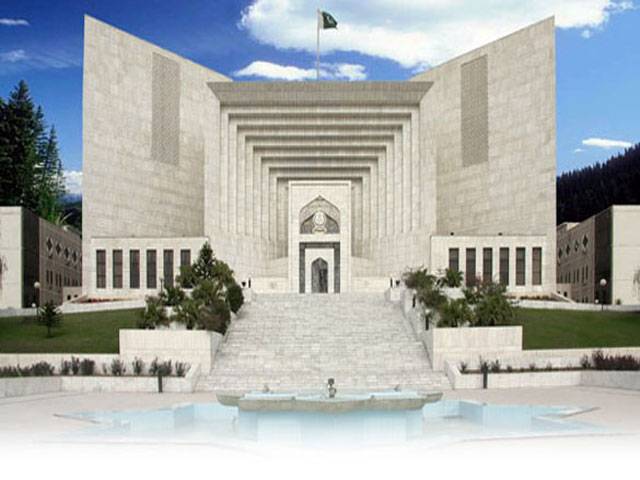ISLAMABAD - A petition has been filed in the Supreme Court requesting its ruling for curbing the powers of National Accountability Bureau and to confine the accountability watchdog to only probe the mega scam of billions of rupees.
The petition termed the sentencing trend as ‘hideously variable’ and urged that there is a dire need of regulating the accountability watchdog in terms of uniform and standardised sentencing guidelines to ensure and effectively safeguard the fundamental rights of citizens.
The petition, under Article 184(3), filed by Advocate Sharjeel Adnan Sheikh has made Ministry of Law and Justice and NAB respondents.
“Rule of Law and the hard-earned and much cherished fundamental rights of the people of Pakistan, to due process, a fair trial, life and liberty, and to the equal protection of the law, should not be allowed to be sacrificed at the altar of corruption eradication.”
The top court is requested, through the instant petition, to issue the requisite and necessary directions for the due provision of a separate hearing for the purpose of sentencing of an accused upon finding of guilt.
Petitioner requests apex court for issuing directions for formulation of appropriate sentencing guidelines
It is further requested to issue directions for formulation of appropriate sentencing guidelines.
“Within the field of white-collar crime, it is submitted that NAB has been taking cognizance of cases other than those involving mega corruption, departing both from its statutory mandate, and its own Guidelines/Standard Operating Procedures with respect to cognizance of cases,” the petition stated.
“Whether NAB will or will not take cognizance of a case is entirely arbitrary, and for accused persons, is akin to being in a lottery; given that the NAB Ordinance contrasts starkly from other laws in respect of the physical remand of an accused, and the severity of sentencing which eventually emerges from trials under the NAB Ordinance. Such a state of affairs is ex facie discriminatory, along with being abhorrent to the Rule of Law and the rights of accused persons to be treated in accordance with law.”
The petition argued that under various international jurisdictions, sentencing is recognised as a separate and distinct stage in trial proceedings, following upon the finding of a guilty verdict against an accused person.
“Such jurisdictions require that once a person is found guilty of the commission of an offence, he is given the opportunity to make representations regarding mitigating factors, and is confronted with other relevant factors for the due determination of the kind, quantum and execution of the corresponding punishment.”
This recognition of the importance of sentencing as a distinct and integral part of the trial process – as important as the adjudication of guilt – has contributed to the gradual build-up of sentencing jurisprudence, without which a humane and robust criminal justice system is not possible.
The petition further argued that sentencing under criminal law is based on various theories, established and recognised as principles of law.
Such sentencing as a penal consequence of commission of a prohibited offence can be based on retribution, deterrence, denunciation, incapacitation, rehabilitation or reparation, stated the petition.
“Under the laws of Pakistan, the bulk of penal sentencing is based on the principles of deterrence i.e. to discourage and prevent the repetition of a prohibited offence as well as rehabilitation i.e. to encourage and prepare convicts to roll back into the society as respectable citizens.”
“It is necessary to appreciate that modern criminal jurisprudence recognizes a dire need, in most instances, for able rehabilitation of convicts as opposed to the permanent disbanding of the individual from the society. In the above purview, it is imperative that the Court ensure the imposition of an appropriate, adequate, just and proportionate sentence with due deliberation upon mitigating circumstances to determine the severity of the punishment required.”
To have the judges make such decisions without impressing upon them the magnitude and importance of this exercise, and without allowing an accused to make representations against the sentence proposed to be imposed on him, is also unconscionable in this day and age, not to mention, violative of the constitutional guarantee to a fair trial and due process.
The petition stated that in Pakistan, there are certain specified areas of criminal law where basic guidelines and directions have been provided through statutory provisions to cater for the specific nature and culpability of an offence and the legislature has provided for minimum sentences for various offences.
“However, by and large, the Higher Judiciary has over the years while pronouncing judgments on individual cases, had to develop general principles of law to be applied by trial and appellate courts whilst determining sentences.”
This great endeavour, the petition maintained, undertaken in the interests of justice, however, is destined to remain a patchwork given that it arises from individual cases litigated in an adversarial system of justice.
“It is now imperative that the legislative and executive branches of the State also play their part in developing and promulgating comprehensive sentencing guidelines.”
Justice Gulzar Ahmed will hear the application against top court’s registrar objections on the petition on March 19 in his chamber.






